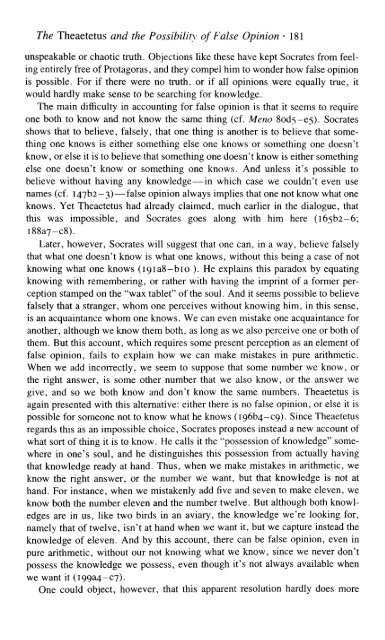Teaching and the Decline of Liberty at Credulity and Curiosity in A ...
Teaching and the Decline of Liberty at Credulity and Curiosity in A ...
Teaching and the Decline of Liberty at Credulity and Curiosity in A ...
You also want an ePaper? Increase the reach of your titles
YUMPU automatically turns print PDFs into web optimized ePapers that Google loves.
The Theaetetus <strong>and</strong> <strong>the</strong> Possibility <strong>of</strong> False Op<strong>in</strong>ion -181<br />
unspeakable or chaotic truth. Objections like <strong>the</strong>se have kept Socr<strong>at</strong>es from feel<br />
<strong>in</strong>g entirely free <strong>of</strong> Protagoras, 3nd <strong>the</strong>y compel him to wonder how fslse op<strong>in</strong>ion<br />
is possible. For if <strong>the</strong>re were no truth, or if all op<strong>in</strong>ions were equally true, it<br />
for knowledge.<br />
would hardly make sense to be search<strong>in</strong>g<br />
The ma<strong>in</strong> difficulty <strong>in</strong> account<strong>in</strong>g for false op<strong>in</strong>ion is th<strong>at</strong> it seems to require<br />
one both to know 3nd not know <strong>the</strong> same th<strong>in</strong>g<br />
shows th<strong>at</strong> to believe, falsely, th<strong>at</strong> one th<strong>in</strong>g<br />
(cf. Meno 8od5-e5). Socr<strong>at</strong>es<br />
is ano<strong>the</strong>r is to believe th<strong>at</strong> some<br />
th<strong>in</strong>g one knows is ei<strong>the</strong>r someth<strong>in</strong>g else one knows or someth<strong>in</strong>g<br />
one doesn't<br />
know, or else it is to believe th<strong>at</strong> someth<strong>in</strong>g one doesn't know is ei<strong>the</strong>r someth<strong>in</strong>g<br />
else one doesn't know or someth<strong>in</strong>g one knows. And unless it's possible to<br />
believe without hav<strong>in</strong>g any<br />
knowledge <strong>in</strong> which esse we couldn't even use<br />
names (cf. I47b2~3) false op<strong>in</strong>ion 3lwsys implies th3t one not know whst one<br />
knows. Yet Theaetetus had already claimed, much earlier <strong>in</strong> <strong>the</strong> dialogue, th<strong>at</strong><br />
this was impossible, <strong>and</strong> Socr<strong>at</strong>es goes along with him here (i65b2-6;<br />
i88a7-c8).<br />
L<strong>at</strong>er, however, Socr<strong>at</strong>es will suggest th<strong>at</strong> one can, <strong>in</strong> a way, believe falsely<br />
th<strong>at</strong> wh<strong>at</strong> one doesn't know is wh<strong>at</strong> one knows, without this be<strong>in</strong>g a case <strong>of</strong> not<br />
know<strong>in</strong>g wh<strong>at</strong> one knows (i9ia8-bio ). He expla<strong>in</strong>s this paradox by equ<strong>at</strong><strong>in</strong>g<br />
know<strong>in</strong>g with remember<strong>in</strong>g, or ra<strong>the</strong>r with hav<strong>in</strong>g <strong>the</strong> impr<strong>in</strong>t <strong>of</strong> a former per<br />
ception stamped on <strong>the</strong> "wax<br />
tablet"<br />
<strong>of</strong> <strong>the</strong> soul. And it seems possible to believe<br />
falsely th<strong>at</strong> a stranger, whom one perceives without know<strong>in</strong>g him, <strong>in</strong> this sense,<br />
is an acqua<strong>in</strong>tance whom one knows. We can even mistake one acqua<strong>in</strong>tance for<br />
ano<strong>the</strong>r, although we know <strong>the</strong>m both, as long as we also perceive one or both <strong>of</strong><br />
<strong>the</strong>m. But this account, which requires some present perception as an element <strong>of</strong><br />
false op<strong>in</strong>ion, fails to expla<strong>in</strong> how we can make mistakes <strong>in</strong> pure arithmetic.<br />
When we add <strong>in</strong>correctly, we seem to suppose th<strong>at</strong> some number we know, or<br />
<strong>the</strong> right answer, is some o<strong>the</strong>r number th<strong>at</strong> we also know,<br />
or <strong>the</strong> answer we<br />
give, <strong>and</strong> so we both know <strong>and</strong> don't know <strong>the</strong> same numbers. Theaetetus is<br />
aga<strong>in</strong> presented with this altern<strong>at</strong>ive: ei<strong>the</strong>r <strong>the</strong>re is no false op<strong>in</strong>ion, or else it is<br />
possible for someone not to know wh<strong>at</strong> he knows (I96b4-c9). S<strong>in</strong>ce Theaetetus<br />
regards this as an impossible choice, Socr<strong>at</strong>es proposes <strong>in</strong>stead a new account <strong>of</strong><br />
wh<strong>at</strong> sort <strong>of</strong> th<strong>in</strong>g<br />
it is to know. He calls it <strong>the</strong> "possession <strong>of</strong> knowledge"<br />
some<br />
where <strong>in</strong> one's soul, <strong>and</strong> he dist<strong>in</strong>guishes this possession from actually hav<strong>in</strong>g<br />
th<strong>at</strong> knowledge ready <strong>at</strong> h<strong>and</strong>. Thus, when we make mistakes <strong>in</strong> arithmetic, we<br />
know <strong>the</strong> right answer, or <strong>the</strong> number we want, but th<strong>at</strong> knowledge is not <strong>at</strong><br />
h<strong>and</strong>. For <strong>in</strong>stance, when we mistakenly add five <strong>and</strong> seven to make eleven, we<br />
know both <strong>the</strong> number eleven <strong>and</strong> <strong>the</strong> number twelve. But although both knowl<br />
edges are <strong>in</strong> us, like two birds <strong>in</strong> an aviary, <strong>the</strong> knowledge we're look<strong>in</strong>g for,<br />
namely th<strong>at</strong> <strong>of</strong> twelve, isn't <strong>at</strong> h<strong>and</strong> when we want it, but we capture <strong>in</strong>stead <strong>the</strong><br />
knowledge <strong>of</strong> eleven. And by this account, <strong>the</strong>re can be false op<strong>in</strong>ion, even <strong>in</strong><br />
pure arithmetic, without our not wh<strong>at</strong> know<strong>in</strong>g we know, s<strong>in</strong>ce we never don't<br />
possess <strong>the</strong> knowledge we possess, even though it's not always available when<br />
we want it (I99a4-c7).<br />
One could object, however, th<strong>at</strong> this apparent resolution hardly does more
















